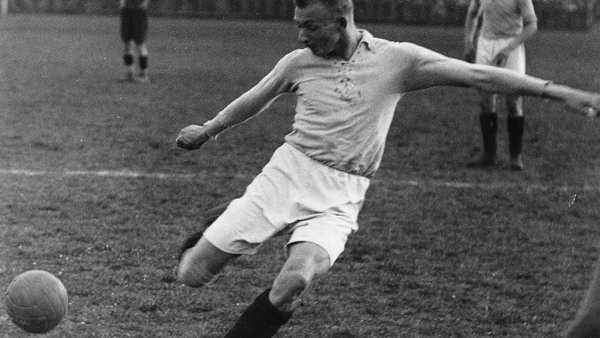We present an extract from The Paper Man, the new novel by author Billy O'Callaghan.
1980s Cork. Jack Shine discovers a shoe box full of love letters in his mother's belongings. Rebekah came to Cork alone as a young Jewish refugee from Vienna when the Second World War broke out. She died soon after, and Jack never learned of his father's identity. Why did she keep newspaper clippings about a famous footballer player? Who was 'The Paper Man'?
Rachel looks up at him and starts to speak, then registering something in his expression, some element of strain, seems to bite down on her words.
The hearth is a neglected redness, and he crosses the room, shifts the cinders in the grate with a clod of turf until he can get it well bedded and adds a split block from the half-sack of birch logs that he bought on the docks from one of the men whose brother or cousin has a line going in firewood. Then, satisfied, he drops down into the armchair left of the fireplace, putting the window at his back with its net curtains diffusing the light, sieving it of its sharpness and turning it frail ahead of first dusk.
The cardboard box rests on his knees, held in place by his two flattened palms, and it is only when, after some seconds have passed, his wife clears her throat, that he is drawn out of his distant trance.
She stares at the box.
He notices and nods, as much to himself as to her, as if granting himself permission, and he slowly picks undone the knot of the binding string and after just a heartbeat’s hesitation lifts away the lid. The contents are neatly bundled, wrapped in red velvet cloth and meticulously tied in broad white ribbon, which he unfurls and spreads with care out across the old teak coffee table. The cache comprises four badly yellowed newspaper clippings, a pair of faded hand- sized photographs, and a sheaf of letters twenty-three of them, once counted, not as straightforward a task as it might initially seem since several of them run to two or even three front- and back- filled pages.
For the next few minutes, while Hannah continues with her drawing, they sift through the pile, passing pieces back and forth between them and handling everything with the utmost care, particularly the newspaper cuttings, which are heavily creased and made so brittle by time that it feels as if the least wrong touch will see them crumble to dust.
The room is silent apart from the ticking of the old tambour mantel clock, gifted to Jack some six years earlier as a memento of his mother’s first cousin Joe, Liz’s father, following the old man’s sudden passing. It was one of the few possessions that Joe had carried across to Ireland from Cham, the small south-eastern German town close to the Czech border where he’d first seen the light of day, a piece even at that point already generations-old and, therefore, precious, its movement forged and shaped within yards, supposedly, of the family home, its oak casing drawn from the nearby Bavarian forests and carved in beautifully decorative shoulder scrolls. Jack can’t recall a time without its beating, and often marvels at the knack it has of lifting its voice in seemingly random moments up out of the general white noise of the world to encroach hard on the listener’s consciousness, forcing him to wonder what there is about it, when its running has been in no way altered, that has him all of a sudden registering its presence again. And becoming so sharply aware of it now turns this Sunday afternoon strange because a memory breaks in his mind of how much Rebekah, after she’d fallen ill, had liked to sit in the stillness of an early morning, slowing herself to an almost prayerful tranquillity and simply absorbing the steady rhythm of the clock’s ticking. I am watching time run, she told him once, when he’d asked what she was doing. And listening to it all pass by. He has many recollections of his mother, and his head teems with details grabbed and held on to from the eleven years they’d had together, but this particular memory is one that he’d either all but forgotten or hadn’t known he’d even packed away. And hearing the clock now, contemplating where each second goes and where it stacks all of the things it carries, he can’t help but feel her somehow attached to the sound, the steady heart- beating quality of its ticking, and still, in this small, odd way, with him and with them all. When he meets Rachel’s stare, across the coffee table and the spill of old words, he has the strangest sense that she is reading his mind.
'German,’ she mutters. She again trawls the sentences of the letter she is holding, her lips moving slightly and in silence, trying to feel their shape. Then, finally, she returns it to the coffee table with the spill of others and slumps back into the settee, her frustration evident. ‘I know a little, but the old ink is hard to make out, and the handwriting is shocking.’ She takes a breath and hesitates with it.
‘But I think they’re love letters, Jack.’
The Paper Man is published by Jonathan Cape

